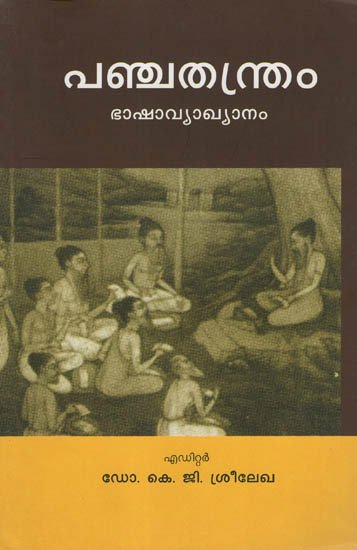Panchatantra [sanskrit]
by Dr. Naveen Kumar Jha | 2016 | 13,828 words | ISBN-13: 9788193077962
The Sanskrit edition of the Panchatantra referencing the English translation and grammatical analysis. Written by Vishnu Sharma and possibly dating as early as 1200 BCE, the Panchatantra (or Pancatantra) represents a collection of short stories teaching basic ethical values and moral conduct that was commonly practiced in ancient Indian. Alternative titles: Śrīviṣṇuśarman Pañcatantra (श्रीविष्णुशर्मन् पञ्चतन्त्र, Śrī-viṣṇuśarman pancatantra, श्री-विष्णुशर्मन्, Sri-visnusarman)
Verse 5.7
न विभाव्यन्ते लघवो वित्त-विहीनाः पुरो ऽपि निवसन्तः ।
सततं जात-विनष्टाः पयसाम् इव बुद्बुदाः पयसि ॥ ७ ॥
na vibhāvyante laghavo vitta-vihīnāḥ puro 'pi nivasantaḥ |
satataṃ jāta-vinaṣṭāḥ payasām iva budbudāḥ payasi || 7 ||
The English translation of Panchatantra Verse 5.7 is contained in the book The Complete Pancatantra: Sanskrit Text with English Translation by Dr. Naveen Kumar Jha. This book is not available online so in order to read the full text and translation you should buy the book:
Buy now! English translation by Dr. Naveen Kumar Jha (2016)
Glossary of Sanskrit terms
Note: This extracts Sanskrit terms and links to English definitions from the glossary, based on an experimental segmentation of verse (5.7). Some terms could be superfluous while some might not be mentioned. Click on the word to show English definitions.
Vibhavin, Vibhavya, Anta, Anti, Laghu, Vitta, Vihina, Purah, Pur, Pura, Puru, Api, Vasanta, Vasat, Satatam, Satata, Jata, Vinashta, Payas, Payasa, Iva, Budbuda,
Analysis of Sanskrit grammar
Note: this is an experimental feature and only shows the first possible analysis of the Sanskrit text (Panchatantra Verse 5.7). If the system was successful in segmenting the sentence, you will see of which words it is made up of, generally consisting of Nouns, Pronouns, Verbs, Participles and Indeclinables. Click on the link to show all possible derivations of the word.
- Line 1: “na vibhāvyante laghavo vitta-vihīnāḥ puro 'pi nivasantaḥ ”
- na -
-
na (indeclinable particle)[indeclinable particle]na (noun, masculine)[compound], [vocative single]na (noun, neuter)[compound], [vocative single]
- vibhāvya -
-
vibhāvin (noun, masculine)[compound], [adverb], [nominative single]vibhāvin (noun, neuter)[compound], [adverb], [nominative single], [vocative single], [accusative single]vibhāvya (noun, masculine)[compound], [vocative single]vibhāvya (noun, neuter)[compound], [vocative single]
- ante -
-
anta (noun, masculine)[locative single]anta (noun, neuter)[nominative dual], [vocative dual], [accusative dual], [locative single]antā (noun, feminine)[nominative dual], [vocative single], [vocative dual], [accusative dual]anti (noun, feminine)[vocative single]√ant (verb class 1)[present middle first single]
- laghavo* -
-
laghu (noun, masculine)[nominative plural], [vocative plural]
- vitta -
-
vitta (noun, masculine)[compound], [vocative single]vitta (noun, neuter)[compound], [vocative single]√vid -> vitta (participle, masculine)[vocative single from √vid class 6 verb]√vid -> vitta (participle, neuter)[vocative single from √vid class 6 verb]√vid -> vitta (participle, masculine)[vocative single from √vid class 7 verb]√vid -> vitta (participle, neuter)[vocative single from √vid class 7 verb]√vid (verb class 2)[imperative active second plural]
- vihīnāḥ -
-
vihīna (noun, masculine)[nominative plural], [vocative plural]vihīnā (noun, feminine)[nominative plural], [vocative plural], [accusative plural]
- puro' -
-
puraḥ (indeclinable adverb)[indeclinable adverb]puraḥ (indeclinable)[indeclinable]pur (noun, feminine)[nominative plural], [vocative plural], [accusative plural], [ablative single], [genitive single]pura (noun, masculine)[nominative single]puru (noun, masculine)[vocative single]
- api -
-
api (indeclinable preposition)[indeclinable preposition]ap (noun, neuter)[locative single]
- ni -
-
ni (noun, masculine)[compound], [adverb]ni (noun, neuter)[compound], [adverb], [nominative single], [vocative single], [accusative single]ni (noun, feminine)[compound], [adverb]nī (noun, masculine)[adverb]nī (noun, neuter)[compound], [adverb], [nominative single], [vocative single], [accusative single]nī (noun, feminine)[adverb]
- vasantaḥ -
-
vasanta (noun, masculine)[nominative single]√vas -> vasat (participle, masculine)[nominative plural from √vas class 1 verb], [vocative plural from √vas class 1 verb]
- Line 2: “satataṃ jāta-vinaṣṭāḥ payasām iva budbudāḥ payasi ”
- satatam -
-
satatam (indeclinable)[indeclinable]satata (noun, masculine)[adverb], [accusative single]satata (noun, neuter)[adverb], [nominative single], [accusative single]satatā (noun, feminine)[adverb]
- jāta -
-
jāta (noun, masculine)[compound], [vocative single]jāta (noun, neuter)[compound], [vocative single]√jan -> jāta (participle, masculine)[vocative single from √jan class 1 verb], [vocative single from √jan class 2 verb], [vocative single from √jan class 3 verb], [vocative single from √jan class 4 verb]√jan -> jāta (participle, neuter)[vocative single from √jan class 1 verb], [vocative single from √jan class 2 verb], [vocative single from √jan class 3 verb], [vocative single from √jan class 4 verb]
- vinaṣṭāḥ -
-
vinaṣṭa (noun, masculine)[nominative plural], [vocative plural]vinaṣṭā (noun, feminine)[nominative plural], [vocative plural], [accusative plural]
- payasām -
-
payas (noun, neuter)[genitive plural]payasā (noun, feminine)[accusative single]
- iva -
-
iva (indeclinable adverb)[indeclinable adverb]iva (indeclinable)[indeclinable]
- budbudāḥ -
-
budbuda (noun, masculine)[nominative plural], [vocative plural]budbudā (noun, feminine)[nominative plural], [vocative plural], [accusative plural]
- payasi -
-
payas (noun, neuter)[locative single]√pay (verb class 1)[present active second single]√pi (verb class 1)[present active second single]√pī (verb class 1)[present active second single]
Other editions:
Also see the following editions of the Sanskrit text or (alternative) English translations of the Panchatantra Verse 5.7
Pancatantra of Visnusarman
by M. R. Kale (2015)
Panchatantra in Simple Sanskrit
by Dr. Vishwas (2016)
Panchatantram (Telugu)
by Tadanki Venkata Lakshmi Narasimha Rao (2020)
Published by J. P. Publications, Vijayawada; Throughout black & white Illustrations; 9788192053851.
Buy now!Preview of verse 5.7 in Telugu sript:
న విభావ్యన్తే లఘవో విత్త-విహీనాః పురో ఽపి నివసన్తః ।
సతతం జాత-వినష్టాః పయసామ్ ఇవ బుద్బుదాః పయసి ॥ ౭ ॥
Panchatantram Bhashavyakhyanam (Malayalam)
by Dr. K.G. Sreelekha (2010)
Published by the University of Kerala.
Buy now!Preview of verse 5.7 in Malayalam sript:
ന വിഭാവ്യന്തേ ലഘവോ വിത്ത-വിഹീനാഃ പുരോ ഽപി നിവസന്തഃ ।
സതതം ജാത-വിനഷ്ടാഃ പയസാമ് ഇവ ബുദ്ബുദാഃ പയസി ॥ ൭ ॥
The Panchatantra Stories (Tamil)
by P. S. Aacharya (2017)
Published by Narmadha Pathippagam, Chennai.
Buy now!
Panchatantrer Galpa (Bengali)
by Children's Book Trust (2014)
Throughout color Illustration; 9788170112730
Buy now!Preview of verse 5.7 in Bengali sript:
ন বিভাব্যন্তে লঘবো বিত্ত-বিহীনাঃ পুরো ঽপি নিবসন্তঃ ।
সততং জাত-বিনষ্টাঃ পযসাম্ ইব বুদ্বুদাঃ পযসি ॥ ৭ ॥
Panchatantra in Gujarati (Comic)
by Anant Pai (2013)
[શિયાળા અને રણશિંગ પંચતંત્ર] Published by Amar Chitra Katha; Throughout Color Illustrations; 9789350853115
Buy now!Preview of verse 5.7 in Gujarati sript:
ન વિભાવ્યન્તે લઘવો વિત્ત-વિહીનાઃ પુરો ઽપિ નિવસન્તઃ ।
સતતં જાત-વિનષ્ટાઃ પયસામ્ ઇવ બુદ્બુદાઃ પયસિ ॥ ૭ ॥
![Panchatantra [sanskrit] - book cover](/uploads/a/Pancatantra.jpg)






